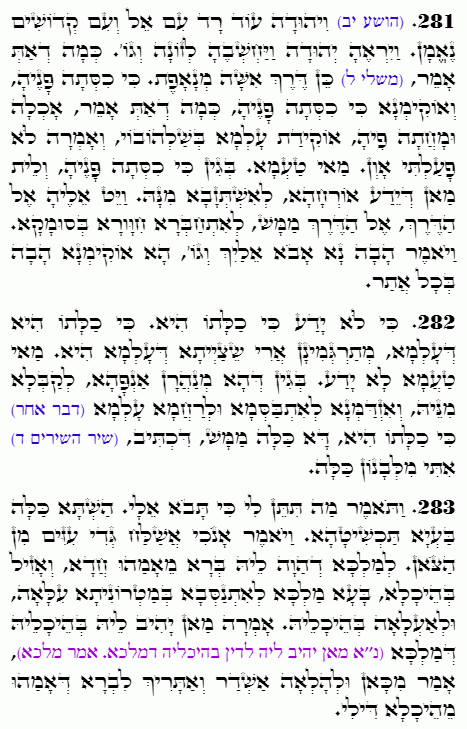Daily Zohar # 4672 – Acharei Mot – Union from the heavens
Daily Zohar 4672

Hebrew translation:
282. כִּי לֹא יָדַע כִּי כַלָּתוֹ הִיא. כִּי כַלָּתוֹ הִיא שֶׁל הָעוֹלָם, מְתַרְגְּמִים: אֲשֶׁר הַשְׁמָדַת הָעוֹלָם הִיא. מָה הַטַּעַם לֹא יָדַע? מִשּׁוּם שֶׁהֵאִירוּ פָנֶיהָ לְקַבֵּל מִמֶּנּוּ, וְהִזְדַּמְּנָה לְבַשֵּׂם וּלְרַחֵם עַל הָעוֹלָם. כִּי כַלָּתוֹ הִיא – זוֹ כַּלָּה מַמָּשׁ, שֶׁכָּתוּב (שיר ד) אִתִּי מִלְּבָנוֹן כַּלָּה.
283. וַתֹּאמֶר מַה תִּתֶּן לִי כִּי תָבוֹא אֵלָי. עַכְשָׁו הַכַּלָּה צְרִיכָה תַכְשִׁיטֶיהָ. וַיֹּאמֶר אָנֹכִי אֲשַׁלַּח גְּדִי עִזִּים מִן הַצֹּאן. לְמֶלֶךְ שֶׁהָיָה לוֹ בֵּן מִשִּׁפְחָה אַחַת שֶׁהָלַךְ בַּהֵיכָל, רָצָה הַמֶּלֶךְ לָשֵׂאת גְּבִירָה עֶלְיוֹנָה וּלְהַכְנִיסָהּ לְהֵיכָלוֹ. אָמְרָה: מִי נָתַן אֶת זֶה בְּתוֹךְ הֵיכַל הַמֶּלֶךְ? (מִי נָתַן אֶת זֶה בְּהֵיכַל הַמֶּלֶךְ? אָמַר הַמֶּלֶךְ:) אָמַר: מִכָּאן וָהָלְאָה אֲשַׁלַּח וַאֲגָרֵשׁ אֶת בֶּן הַשִּׁפְחָה מֵהֵיכָלִי.
.
Zohar Acharei Mot
Continued from previous DZ
#281
Genesis 38:15
“וַיִּרְאֶהָ יְהוּדָה וַיַּחְשְׁבֶהָ לְזוֹנָה כִּי כִסְּתָה פָּנֶיהָ.”
“And Judah saw her, and thought her to be a harlot”.
This is as it is written,
Proverbs 30:20
“כֵּן דֶּרֶךְ אִשָּׁה מְנָאָפֶת אָכְלָה וּמָחֲתָה פִיהָ וְאָמְרָה לֹא פָעַלְתִּי אָוֶן.”
“This is the way of an adulterous woman: She eats and wipes her mouth And says, “I have done no wickedness.”
We have already explained that “for she has covered her face” means, as it says, “She eats and wipes her mouth, and says, ‘I have done no wrong.”” She burns the world with flames yet claims, “I have committed no sin.” What is the reason for this? It is because she has covered her face, and no one knows how to escape her. “וַיֵּט אֵלֶיהָ אֶל הַדֶּרֶךְ” “And he turned to her by the road” (Genesis 38:16), meaning literally “by the road,” to connect white with red (Chessed with Gevurah). “And he said, “וַיֹּאמֶר הָבָה נָּא אָבוֹא אֵלַיִךְ” ‘Please let me come into you,'” (Genesis 38:16). We have already explained the meaning of “please” (הָבָה) everywhere, which indicates an invitation.
Notes:
Tamar’s act of “covering her face” symbolizes spiritual concealment. This concept highlights the idea that her deeper purpose and righteousness are obscured, making her actions seem sinful on the surface. Just as someone might claim innocence after committing wrongdoings because they are hidden from view, Tamar’s intentions remain hidden, but her actions have a greater divine purpose.
The passage delves into the hidden spiritual levels of Tamar’s actions. While Judah perceives her as a harlot, Tamar’s actions are part of a divine plan meant to rectify forces by uniting mercy and judgment. Her covering of the face symbolizes the concealment of her true intentions, which are ultimately righteous. The Zohar reveals that this encounter, on a deeper level, is a process of spiritual unification that brings about redemption and continues the line of Mashiach.
#282
“כִּי לֹא יָדַע כִּי כַלָּתוֹ הִוא” “For he did not know that she was his daughter-in-law” (Genesis 38:16). This means “for she was the daughter-in-law of the world,” meaning that he did not know that she would bring about the end of the world. The word “daughter-in-law” (כלתו) is related to the word “kallah” (bride), which can also mean “destruction/end” (כליה). Why did he not know? It was because her face shone to receive from him, and she was destined to bring fragrance (renewal) and mercy to the world. Another interpretation of “for she was his daughter-in-law” is that she is the bride, as it is written, “אִתִּי מִלְּבָנוֹן כַּלָּה” “Come with me from Lebanon, my bride” (Song of Songs 4:8).
Notes:
Zohar’s interpretation of “for he did not know that she was his daughter-in-law” transforms Judah and Tamar’s narrative into a profound spiritual allegory. Tamar, as the “bride” or “destroyer (brings the end),” carries a dual role in Hashem’s plan—her actions both break and renew, bringing about the next stage in the process of mercy and redemption. Tamar is part of a broader spiritual narrative that elevates the world, even through seemingly destructive actions, aligning her with the concept of the divine bride who completes and fulfills the ultimate purpose.
#283
She said, “וַתֹּאמֶר מַה תִּתֶּן לִי כִּי תָבוֹא אֵלָי” ‘What will you give me, that you may come in to me?’ Now, the bride (Tamar) needed ornaments. And he said, ‘I will send you a young goat from the flock.'” This is similar to a parable: A king had a son from a certain maidservant, and this son was walking in the palace. The king desired to marry a noble lady and bring her into his palace. She (the noble lady) asked, ‘Who allowed this (son of the maidservant) into the king’s palace?’ The king said, ‘From now on, I will send him away and expel the son of the maidservant from my palace.’
Notes:
Judah’s promise to send a goat symbolizes an offering or sacrifice made to prepare for this spiritual union. The goat represents a material offering that allows for spiritual elevation. In the Zohar, offerings often have deep meanings, representing efforts to bridge the gap between the physical and spiritual worlds.
The king’s decision to send away the “son of the maidservant” symbolizes the expulsion of negative forces or impure elements from the upper realm. This cleansing allows for the proper spiritual union between the Shechinah (the bride) and the higher aspects (the king).
{||}

 Previous: Acharei Mot
Previous: Acharei Mot

